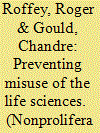| Srl | Item |
| 1 |
ID:
156686


|
|
|
|
|
| Summary/Abstract |
In recent years, biological weapons issues have repeatedly been raised by Russian officials and state-controlled media. Considering that biological weapons development and the use thereof are banned by international law, to insinuate that another state is engaged in activities with offensive signatures is politically sensitive. What are the underlying motives for raising these issues? Is Russia using anti-American propaganda in the biosecurity arena as a tool to discredit the United States for general political reasons, or is it used as a means for internal purposes to motivate increased funding for advanced biodefense research and development? A need for additional funding is also in line with views of the Russian military and security doctrines where the threat from biological weapons is explicitly addressed. Russian discrediting is related to the US support of biosafety/biosecurity upgrades at biological laboratories in the former Soviet republics. This Russian stance toward the United States was also reflected in the run-up to the 8th Review Conference of the Biological and Toxin Weapons Convention (BTWC) in 2016, supported by statements of officials indicating that Russia is threatened by US activities in the biological weapons area. This type of unsubstantiated accusations has not been helpful when attempts were badly needed to make progress in the BTWC context. Russian disinformation campaigns, in relation to biological weapons and possible underlying causes, are presented and discussed.
|
|
|
|
|
|
|
|
|
|
|
|
|
|
|
|
| 2 |
ID:
107573


|
|
|
|
|
| Publication |
2011.
|
| Summary/Abstract |
The scope of the Biological Weapons Convention (BWC) is sufficiently broad to deal with new threats emerging from developments in the life sciences; however, more thought still needs to be given to updating and improving measures to encourage biodefense-related information sharing and transparency between states. Biodefense is and has been at the core of the BWC, but the threat of bioterrorism should not distract BWC state parties or cause them to disregard the risk that illicit state-run bioweapons programs will utilize new advances in the life sciences. More states are pursuing biodefense programs-and spending more on such programs. The BWC community must address the issue of how states and civil society observers can determine the point at which a biodefense program, or parts of it, could be secretly transformed into an offensive bioweapons program. The authors propose several measures for increasing the transparency of biodefense programs, including: national oversight, confidence-building measures, mandatory codes of practice, confidence-building visits, and an international mechanism to encourage and protect whistleblowers. The authors conclude that unless accountability and transparency in biodefense programs can be attained within the next five years, the BWC will lose its relevance.
|
|
|
|
|
|
|
|
|
|
|
|
|
|
|
|
| 3 |
ID:
123222


|
|
|
|
|
| Publication |
2013.
|
| Summary/Abstract |
Science and technology can play a crucial role in the long-term for the modernization of Russia and the armed forces, and many government initiatives have been approved but their implementation can be questioned. Russia has a strong science base into which it invests substantial funds, but that only to a limited extent generates competitive innovative products and services. The government still hopes the defense sector can be the driving force for innovation that is questioned in this article. The civilian research and development could be the driving force needed for promoting innovations but the problems that remain for the civilian science and technology sector are significant. The reform of the defense industry has been a long-time priority but very slow progress is being made due to difficulties to control it and because the problems facing the defense industries and research and development are even more serious in this sector in spite of large funding increases.
|
|
|
|
|
|
|
|
|
|
|
|
|
|
|
|